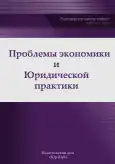Алгоритм оценки компании при антикризисном управлении
- Авторы: Мухортов Д.В.1
-
Учреждения:
- Воронежский государственный лесотехнический университет им. Г.Ф. Морозова
- Выпуск: Том 18, № 6 (2022)
- Страницы: 321-325
- Раздел: Статьи
- URL: https://journal-vniispk.ru/2541-8025/article/view/147328
- ID: 147328
Цитировать
Аннотация
В современных условиях российские компании вынуждены функционировать под мощным воздействием макроэкономического шока, вызванного массированными антироссийскими санкциями «коллективного Запада». Это существенно ослабляет их потенциал развития и приводит к необходимости более активного использования мер антикризисного управления. Кризис по-разному затронул разные компании. Некоторые из них уже испытали его на себе, другие же пока продолжают развиваться и работать в стабильном режиме. Но высокий уровень неопределенности вынуждает все компании активизировать контур антикризисного менеджмента. Статья посвящена раскрытию теоретических и методических аспектов влияния кризиса на бизнес, на основе чего автором разработан и описан алгоритм оценки компании при антикризисном управлении. Показано, что в силу многообразия кризисных проявлений и слабой предсказуемости дальнейшего развития ситуации, для оценки состояния компаний (на предмет выявления уровня кризисности ее показателей) следует использовать системное описание ее основных подсистем. Предложенный алгоритм оценки компании при антикризисном управлении учитывает состояние дел в сферах продаж, производства, закупок, логистики и т.д. с последующим расчетом интегрального показателя.
Об авторах
Дмитрий Викторович Мухортов
Воронежский государственный лесотехнический университет им. Г.Ф. Морозова
Email: dmitry.mukhortov@gmail.com
аспирант Воронеж, Российская Федерация
Список литературы
- Булгакова М.А. Обеспечение экономической безопасности России в современных условиях поиска нового качества функционирования экономики // Учет, анализ и аудит: проблемы теории и практики. 2022. № 28. С. 27-30.
- Вертакова Ю.В., Бабич Т.Н., Клевцова М.Г., Лебеденко О.С., Положенцева Ю.С., Тренев Н.Н. Новая парадигма экономического развития в эпоху трансформаций. Курск, 2022. 140 с.
- Гришков В.Ф. Воздействие политико-экономической турбулентности на экономику региона (на материалах Ленинградской области) // Известия Санкт-Петербургского государственного экономического университета. 2022. № 4 (136). С. 88-95.
- Гришков В.Ф., Плотников В.А., Фролов А.О. Мобилизационная экономика в современной России: теоретические аспекты // Известия Санкт-Петербургского государственного экономического университета. 2022. № 3 (135). С. 7-13.
- Измалкова И.В., Вертакова Ю.В. Управление рисками деятельности кластерных структур: теория и инструментарий. Липецк, 2022. 210 с.
- Капогузов Е.А., Чупин Р.И. «Санкции 2022»: возможности и ограничения реакционного регулирования со стороны российского государства // Journal of Economic Regulation. 2022. Т. 13. № 1. С. 67-74.
- Кирюшкина Н.В., Полищук Н.В. Теория и практика антикризисного управления в условиях трансформации российской экономики. М., 2021. 116 с.
- Котляров И.Д., Курбанов А.Х. Практический аутсорсинг: проблемы и пути решения. СПб., 2012. 221 с.
- Крыжановская О.А., Логвинова И.О., Мухортов Д.В. Инструментарий менеджмента компаний в условиях критических вызовов внешней среды // Известия Юго-Западного государственного университета. Серия: Экономика. Социология. Менеджмент. 2021. Т. 11. № 1. С. 58-70.
- Моисеев Н.Н. Человек. Среда. Общество. Проблемы формализованного описания. М.: Наука, 1982. 239 с.
- Мухортов Д.В., Фролов А.О. Оценка влияния кризиса на нефтегазовую отрасль РФ // Теория и практика сервиса: экономика, социальная сфера, технологии. 2022. № 3 (53). С. 31-34.
- Плотников А.В. Моделирование форм проявления кризиса в национальной экономике под воздействием неэкономического шока (на примере кризисов в России 2020 и 2022 годов) // Известия Санкт-Петербургского государственного экономического университета. 2022. № 5-2 (137). С. 194-199.
- Плотников В.А. Транснациональные цепочки создания ценности и глобальные механизмы ценообразования: взгляд теоретика // Известия Санкт-Петербургского государственного экономического университета. 2022. № 2 (134). С. 7-13.
- Ряховская А.Н., Волков Л.В., Акулов А.Я., Ганцева Л.В., Жаргалсайхан Н., Кожевина О.В., Кочетков Е.П., Мокрова Л.П., Ряховский Д.И., Федоров Я.П. Развитие антикризисного управления в условиях глобальной трансформации. М., 2021. 208 с.
- Смешко О.Г., Плотников В.А., Вертакова Ю.В. Перспективы российской экономики: новые вызовы экономической безопасности и перестройка государственного управления // Экономика и управление. 2022. Т. 28. № 6. С. 524-537.
- Шиндикова И.Г. Анализ подходов к определению категории «экономическая безопасность» // Теория и практика сервиса: экономика, социальная сфера, технологии. 2020. № 2 (44). С. 24-27.
- Юсуфова А.М. Подход к оценке устойчивости организаций в условиях шоков внешней среды (на материалах строительной отрасли Дагестана) // Известия Санкт-Петербургского государственного экономического университета. 2021. № 3 (129). С. 186-190.
Дополнительные файлы








